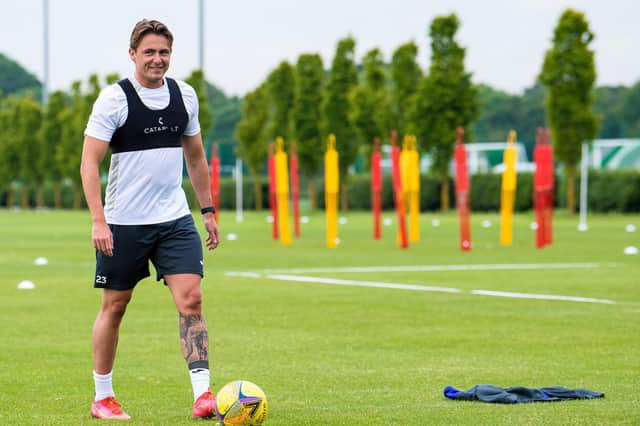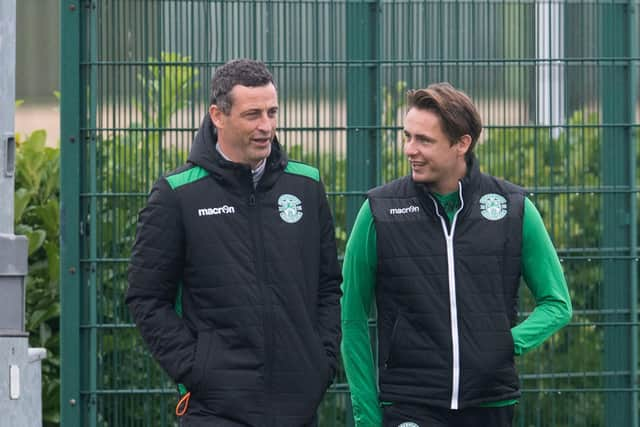Hibs' Scott Allan opens up on heart condition he feared would force him to quit football


Speaking to the British Heart Foundation's Ticker Tapes podcast, the 29-year-old reflected on the series of events that started with tiredness during training and ended with him fearing the end of his career following the diagnosis of hypertrophic cardiomyopathy [HCM].
“I’d had a really good 2019/20 season before the coronavirus pandemic; I had the most goals and most assists I’d ever managed and I was really looking forward to coming back and picking up where I’d left off,” he said.
Advertisement
Hide AdAdvertisement
Hide Ad"Two or three weeks into pre-season I didn’t feel myself – extreme fatigue, and when I was doing certain runs in training I was getting blurred vision and faint-like symptoms and feeling dizzy.”


Allan battled through to the start of the competitive season but it wasn’t until a Scottish Premiership match against Aberdeen at Easter Road that he began to suspect something was wrong.
"It wasn’t until I realised how much it was impacting on my performance on a match day and it must have been about the fifth game in that I thought, ‘something’s not right here’.
"People assume it’s the diabetes because hypoglycaemia symptoms are very similar to the ones that show with HCM but I knew it wasn’t the same thing.
Advertisement
Hide AdAdvertisement
Hide Ad"I went to my doctor to get tested and then I played against Aberdeen. I remember coming in, I was physically weak, I was really poor in terms of performance level, which I know wasn’t like me.


“It was after that I felt I needed to get my heart tested and they arranged for me to go to the Hampden clinic.
"The cardiologist wasn’t particularly happy, so they spoke to the Hibernian doctor and he suggested going to London for further tests.
"As a football player you think everything will be okay. It wasn’t the first time I’d had problems with the ECG [electrocardiogram] and I thought I would just go down [to London], they would tick a box and I would be okay, it would be something else.”
Advertisement
Hide AdAdvertisement
Hide AdAllan did a series of tests with the results causing concern for the doctor.
"I could just tell by his reaction that there was something he wasn't happy about. That’s when he took me upstairs to his office and went through the diagnosis with me. Just me and him in the office.
"I was there on my own and when someone advises you that you should retire… it’s one of those moments I would love to forget, but I will never forget.”
The playmaker was given some time to himself to process the information.
Advertisement
Hide AdAdvertisement
Hide Ad"I remember being on the phone to my mum trying to explain to her what the diagnosis was. I couldn’t get the words out. I broke down, she broke down, and I hung up the phone and took a couple of minutes to sit there and absorb what had just been said.
"When you’ve given everything for a career, for there to be something like that, when it’s not on your own terms… it was such a strange day.”
Allan tried to keep himself busy as a way of coping with the news.
"For the first week, when I thought that was it, I didn’t feel sorry for myself – I got motivated to do other things. Maybe that was just my grieving process; thinking if I kept myself busy then after football I’d be fine.”
Advertisement
Hide AdAdvertisement
Hide AdTelling his team-mates and staff at Easter Road was difficult, however.
“When you tell your teammates and you see them getting upset… in the sports world, everybody’s got their pride so seeing them and the manager really emotional was strange, but I had great support from everybody.
"I was scouting games and keeping myself busy. Doing other things helped me deal with might have been.
"I was going into training every day to still be a part of things. Seeing everybody doing what I love to do, it started to sink in a little but I wasn’t going to make any complete judgement until I had spoken to a second cardiologist.”
Advertisement
Hide AdAdvertisement
Hide AdAllan was put in touch with an HCM specialist in New Jersey, whose explained that hydration and heat can affect the outcome of the test.
"When I did the first test, I probably wasn’t as hydrated as I should have been and it was about 26 or 27 degrees so when I went to see another cardiologist in Leeds I made sure that wasn't going to be a factor, plus it was winter so heat wasn’t an issue.
"I did the test with him and the results showed I could keep playing, and that was a real positive.”
Allan had conversations with former Scotland internationalist Graeme Souness and Ajax footballer Daley Blind, who plays with a more serious case of HCM.
Advertisement
Hide AdAdvertisement
Hide AdAfter getting the all-clear to resume playing, Allan spent time on loan at Inverness Caledonian Thistle last season and has already taken part in Hibs pre-season programme.
On top of his role as an ambassador for Diabetes UK, he will no doubt be an inspirational figure for younger players suffering from similar conditions.
James Jopling, head of the British Heart Foundation Scotland, said: “We are so grateful to Scott for sharing his experience so honestly and for all he is doing to help us raise awareness of hypertrophic cardiomyopathy.
“Over the last 60 years, BHF-funded research has played a huge role in identifying the faulty genes causing the condition and we’ve helped make genetic testing available to families affected across the country.
Advertisement
Hide AdAdvertisement
Hide Ad“Our research is only made possible thanks to the generosity of the public. As we mark our 60th birthday and look ahead to the future, our goals are even more ambitious. We really do need your help now more than ever.”
A message from the Editor:
Thank you for reading this article. We're more reliant on your support than ever as the shift in consumer habits brought about by Coronavirus impacts our advertisers.
If you haven't already, please consider supporting our sports coverage with a digital sports subscription.
Comment Guidelines
National World encourages reader discussion on our stories. User feedback, insights and back-and-forth exchanges add a rich layer of context to reporting. Please review our Community Guidelines before commenting.